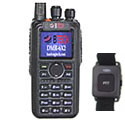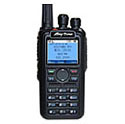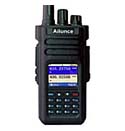Product Review
Ailunce HD1
Dual Band
DMR Handheld
TDMA Tier I / II
VHF / UHF
November 2017
Rev. April 2019

|
Ailunce HD1
The Ailunce HD1 is a true Dual Band band (UHF / VHF) DMR handheld that can be used as either an FM analog transceiver or Tier II DMR digital. This is one of the newer DMR transceivers designed specifically with the ham radio operator in mind. In the Box Included with the radio are the: - 3200mAh Li-Ion Battery (now with USB-C charging) - Belt clip - Carry Strap - 73 page User Guide – English - Charger base & AC adapter - Antenna – 6.75" (17.1cm) - Programming Cable General Description - DMR / FM - VHF / UHF Dual Band - 136-174 400-480 MHz - 1W / 10W transmit - 3000 channel - 10,000 contacts - 200,000 DMR User DB contacts Dual Band Operation Most new DMR transceivers are going the direction of Dual Band, and the HD1 is no exception. The radio has plenty of storage capability with up to 3K channels, 10K TG contacts, and 200K for the DMR ID database. Transmitter The radio's frequency range is VHF 136-174 and UHF 400-480 MHz. Over-the-Air audio reports are excellent and power levels were very good. Rated at 10W, the output power was very close to spec into a calibrated 50 ohm Bird Termaline wattmeter. The latest firmware has added a Microphone audio gain control to its list of functions. I found the high power setting was a little unstable on UHF high power, fluctuating from 10w to 8w then back to around 10w into the wattmeter. This may be due to an impedance mismatch. The HD1 antenna, however, is a very solid stable match for the radio.
Receiver and Audio The receiver sensitivity is very good on both digital and analog. There's plenty of loud and undistorted audio with a 500mW audio amp. I did notice, however, a pop when a station breaks open the squelch on both digital and analog. Enclosure The HD1 case has a solid feel, weight, and durability. It weighs in at a hefty 12.7 oz (303g) with the battery attached. The battery lock is designed to make removal quick and easy. A slight pull on the battery tab releases battery which then pulls away from the radio body.
The PTT button only requires a light push to activate the transmitter. Just under the PTT switch are two programmable keys that respond to both long and short key presses.
Antenna The included dual band antenna is 6.75" which is a fairly common size for a handheld and is terminated with a standard SMA-Female. The standard antenna seemed to do a respectable job. Using the RSSI reading from a local UHF repeater, I found a slight increase of about 2 dB using an upgraded 15" antenna which is about what I expected. Display The radio has a multicolor display. The main background is a sky blue with multicolor icons. The screen size is 1.1" x 1.4" with excellent resolution. Below are examples of the LCD when receiving digital and analog signals. The LCD now displays 12 large easy to read characters (originally only 9) when displaying the channel, but I found 5 lines displayed when receiving are clear, but a little small. The latest firmware (8/13/18) now allows you to mix Channel mode and VFO mode on the LCD
Programming If you are entering the world of DMR for the first time, be aware that programming a digital radio is very different than an FM transceiver. You still need to enter the frequency and Color Code (digital version of CTCSS), but navigating the network can be a bit overwhelming at first. Don't let that intimidate you. There are several YouTube videos and user groups available to assist, but I also recommend that you find someone in your area or local radio club that can assist with showing you the procedure for developing and enhancing your own customized software data image (a.k.a. code plug). Here is a link to a few code plug samples to help familiarize you with the format and get you started. These were developed for the So Central PA cluster of repeaters, but can be altered to work on your local repeaters. Starter_Code_Plugs Firmware The HD1 firmware is easily upgradable, so as advances and options are developed, you have the ability to update the radio to the latest version. The firmware upgrades can be done with a Windows computer in about 5 minutes. Programming Cable The HD1 programming connector is similar to that found on the Motorola GP328. The UART chip is inside the cable and the driver for this radio will load automatically. Note: The HD1 Spkr/Micr is compatible with that found on the GP328
Battery and Charger The battery efficiency is very good. With the 3200 mAh battery I can get a couple days from a single charge. The battery now comes with a USB-C charging port. The charger base requires a standard 12vdc wall wart, however the provided wall adapter is 10V 480mAh. A standard 12V adapter measures 12.5V on the meter, where the provided 10V adapter is only 11.0V. The charger output to the battery is still 8.4V to the battery even with the light weight adapter. The LED on the front of the charger base is Red when charging, and Green when either fully charged or no radio in the cradle.
Conclusion The HD1 is a good performing dual band DMR and analog transceiver built with the Ham Radio operator in mind. It's original delivery date was delayed for about 4 months. A wise decision to wait until the radio was ready. The firmware is upgradable so enhancements can be made as they are needed. Retevis did a pretty good job with this one. Review Summary: - True Tier II DMR dual band operation - Software easy to manipulate - Main LCD is easy to read - Plenty of battery life - Now Supports DMR DB (200K) - Firmware easy to update - USB-C charging Note: This equipment was received for the purpose of a fair and unbiased review. All findings are factual based on the equipment I received. Any issues found have been reported both here and back to the seller or manufacturer.
|
BTECH  DMR6X2 PRO Dual Band (Review) Anytone  D878UV II+ Dual Band (Review)  D578UV Series Mobiles Hotspot  SkyBridge MAX (Review) Ailunce  HD1 / GPS (Review) Amplifiers  BTECH DMR Amps UHF VHF (Review) Repeaters  Ham / GMRS Commercial Repeaters Duplexers |













